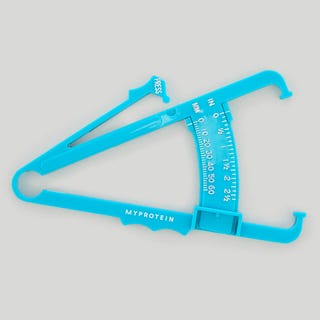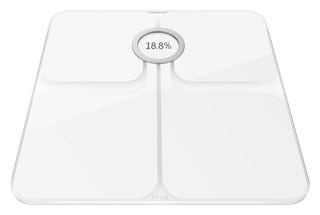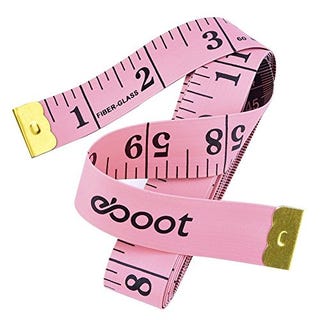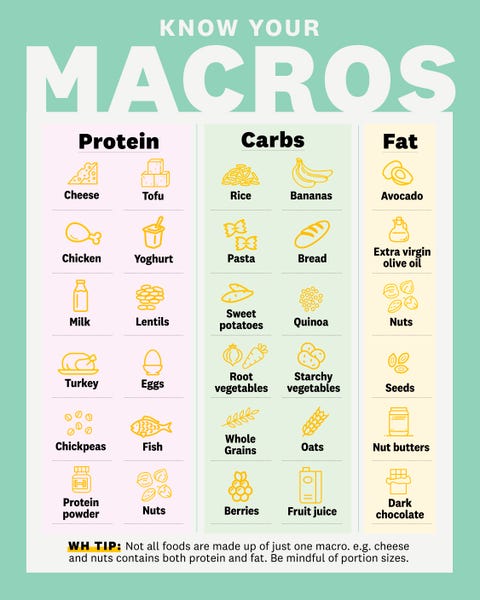How to Lose Weight Diet and Exercise Plan
Learning how to lose weight well can really be the difference between sustainable healthy weight loss and gaining and losing the same five pounds of water weight over and over again. Whilst crash diets are attractive in their big (and widely false/dangerous/misleading) promises, opting for a drastically restrictive eating protocol is likely to make you miserable and, probably, heavier than before you started.
Instead, let's get to grips with how to lose weight in a safe and healthy manner that'll keep you feeling good for the long run.
How much weight should I be losing per week?
'You should be aiming to drop around 1 – 2 lbs of body fat per week,' says Mark Bohannon, manager and head personal trainer of Ultimate Performance Manchester. (However, depending on how much weight you have to lose, this number may fluctuate. More on this later.)
'Any more than that and there is the potential that you'll be losing muscle, too,' he says. 'Every pound of muscle you hold onto can burn up to 50 calories extra per day,' Bohannon says.
It's also important to remember that if you have more weight to lose you can expect to drop more initially. This rate will naturally slow over time as you near a healthy weight for your body. 'At first, you'll be shedding water, inflammation and toxins from the body,' Bohannon says. 'It won't necessarily just be fat.'
So, don't get disheartened if things slow up – slow and steady absolutely wins the race.
When it comes to keeping tabs of your progress, Bohannon recommends taking an average of three weigh–ins spread over the course of a week; and tracking measurements of the waist, hips, upper arms and upper legs every two weeks.

RENPHO Bluetooth Body Fat Scale
RENPHO amazon.co.uk
£20.98

Myprotein Body Fat Calipers
Myprotein myprotein.com
£4.00

Fitbit Aria 2 Wi-Fi Body Weight Analysis Scale
Fitbit argos.co.uk
£79.20

Tape Measure 150cm - Inches and cm
Concept4u amazon.co.uk
£2.50
What should I be eating in a day to lose weight?
Knowing how to lose weight well comes down to how you eat as much as how you exercise. To work out how much (and of what) to eat, counting your macros (protein, fats and carbohydrates) can be a simple way to debunk the noise and eat in a satiating, sustainable way that still helps you hit your goals.
OK but what are macros?
Macronutrients are the three main food groups for humans: Protein, fats and carbs. The ratio and volume you eat these foods in can help you lose weight well.
Not sure what actual foods fit into these categories? Scroll for our visual guide.

How do I work out how much of each macro to eat?
To calculate what you need to eat, there are a couple of steps to follow. Fortunately for you, we put them all in a handy infographic – you're welcome.

Everything you need to know about crash dieting
'Much of the weight loss from crash diets is fluid,' says Dr Adam Collins, senior tutor in nutrition at the University of Surrey. 'But you're also at risk of losing body protein as your body tries to maintain blood glucose levels by gluconeogenesis – basically melting your muscles into sugar.'
And it gets worse. Crash dieting, although it could produce results in the short-term, may actually end up making you gain weight. 'The shrinking of your fat cells during a crash diet actually drives the production of new fat cells.' Eek.
Couple this with changes to your energy levels (you'll have less of it) and appetite (you'll be hungrier) from consuming fewer calories and you're looking at your body's attempt to better prepare itself for the next 'crisis'. 'The propensity for weight gain remains even one year after fat loss,' Dr Collins says.
In a 2016 review of very-low calorie diets, UK researchers reported fatigue, dizziness, cold intolerance and hair loss as key side effects, as well as an inflated risk of developing more serious issues such as gallstones.
'Crash diets also lead to nutritional deficiencies,' says Harley Street nutritionist and author of Re-Nourish (Yellow Kite) Rhiannon Lambert. 'Which, if left unchecked for a progressive amount of time, may result in poor health and side effects such as heart palpitations, dehydration and cardiac stress. Rather than counting calories, look at your plate and see what is on there. What benefits is each food bringing to your body?'
Do crash diets wreck your metabolism?
'Your metabolic rate is determined by your age, gender, height, and yes, weight and body composition. While any weight loss does reduce it (a smaller body burns fewer calories), it's thought crash diets exacerbate the drop due to 'adaptive thermogenesis'' (AT), explains dietician Laura Tilt.
'This means your body defends itself against weight loss by reducing calorie burn so it runs more 'efficiently'. Research suggests that the more severely you restrict your calories, the harder AT kicks in, thus making crash diets counterproductive.'
How can my workouts help me lose weight?
It's the ongoing debate: cardio or weights and for good reason. Cardiovascular exercise (running, walking, swimming, dancing) are great for your heart health, increasing your heart rate and helping your body stay in a calorie deficit. Strength training, however, helps to build lean muscle tissue which can help you burn more calories throughout the course of the day.
The best approach to exercise if weight loss is your goal is to find something you can stick to consistently and trying to balance cardio work with resistance training, too. So, whether that looks like getting out for a run twice a week with two bodyweight strength training workouts thrown in as well, or mixing up HIIT (high intensity interval training) with LISS (low intensity steady state exercise), or getting down to your yoga mat (yes, yoga for weight loss is a real thing)
'Building lean muscle is essential, says fitness consultant Tom Pitfield. 'But you must enjoy your workout, too.'
This workout is part of PT Alice Liveing's exclusive 28-day challenge for Women's Health, aiming to get you comfortable and confident with basic resistance training.
3 ways to measure your fitness progress that aren't scales
According to mental performance coach Andrew Cohen-Wray there are several ways to measure fitness progress without resorting to stepping onto the scales.
1. Performance
'Firstly, you can set goals based on performance results, such as finishing in the top #3, #10 or #100 of an event you set out to compete in,' he explains. While this method requires participation in a larger event, alongside other competitors – which is out of the question right now – there are solo-ways to measure your successes too.
2. Time
'Secondly, you could measure your progression with time-based results,' but, he cautions, ' don't expect to be going for a run every single weekend, hitting a new PB. You can't run yourself flat out all of the time.'
3. Physiological
'Thirdly, there are process-based results – these are goals that occur by your engagement in the process of trying to improve your fitness, such as a lower resting heart rate, easier and more restful sleep, better cognitive ability and the emotional agility in making decisions quickly,' Cohen-Wray explains.
'At the end of the day, it's all about your internal dialogue - how you speak to yourself is how you drive better results. It's about being happy with yourself and not being too brutal.'
Amen to that.
What impact will my period have on my losing weight?
There's no escaping it; that time of the month is going to have an impact on your weight. 'A woman's hormones can affect her progress, mood and hunger' Bohannon says. The key to losing weight well, then? Knowing how to play them to your advantage.
'During your follicular phase, oestrogen begins to steadily rise,' Bohannon says (Read this if you've no idea of the signs of ovulation).
'During this time, you will have less cravings and will be in a better position to burn fat – so ramp up your training. When in the luteal phase, oestrogen starts to drop meaning more cravings and high intensity training can feel harder.'
And it's not only oestrogen you need to be aware of. 'Hormone imbalance of any kind can hinder weight loss,' says Lambert. 'Stress, for example, can increase the secretion of cortisol, which may lead to increased appetite. We should also be mindful of our leptin and insulin levels.' Read here for how managing insulin through training can help you lose weight as well as assisting with things like PCOS weight loss.
How can I make sure the weight stays off?
In essence, losing weight is the easy bit; keeping the weight off is the challenge. 'The problem is in most diets, people lose the weight and then return to their original diet / lifestyle,' says Dr Collins. Which is why when it comes to how to lose weight, it's best viewed as a lifestyle overhaul.
'Remember that nobody is perfect,' says Bohannon.'Don't go into self-destruct mode every time you make a 'mistake'; just get back on the plan. And if you stay on plan even 80% of the time throughout the year, you'll make some amazing progress.'
Pitfield agrees. 'The secret to sustainable weight loss is balance,' he says. 'It's not always easy to achieve your weight loss goals when faced with long working hours, screaming toddlers etc. Utilise the time you do have and maximise your workouts.'
Looking for a new mantra? Think 'quality over quantity' and you won't go far wrong..
Cut through the noise and get practical, expert advice, home workouts, easy nutrition and more direct to your inbox. Sign up to the WOMEN'S HEALTH NEWSLETTER
This content is created and maintained by a third party, and imported onto this page to help users provide their email addresses. You may be able to find more information about this and similar content at piano.io
How to Lose Weight Diet and Exercise Plan
Source: https://www.womenshealthmag.com/uk/food/weight-loss/a707672/how-to-lose-weight-well/



Komentar
Posting Komentar